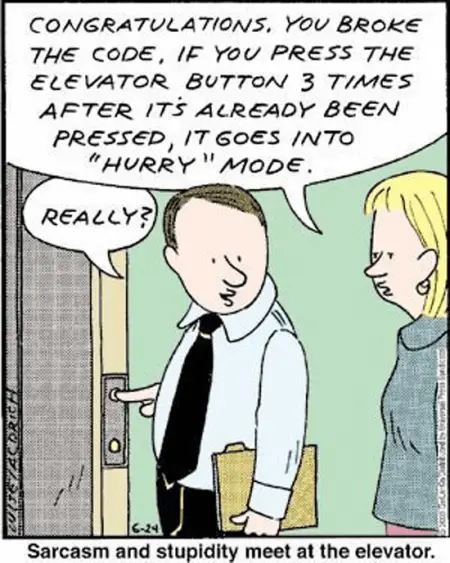Have you ever read someone’s comment and wondered if that person was being sarcastic or just facetious? If this has happened too many times in your life, this article is for you. Read on as we discuss the difference between the words “sarcastic” and “facetious.”
Summary Table
| Sarcastic | Facetious |
| Comes from the Greek word sarkazein which means “to speak bitterly” | Comes from the Latin word facetus which means “witty” |
| Means “having the characteristics of sarcasm” or “the use of ironic statements to purposefully mock or ridicule a person” | Means “taking things in a humorous and usually inappropriate manner” |
| Aims to hurt, ridicule, or insult | Aims to be funny without contempt or malice |
Definitions

The term sarcastic means “having the characteristics of sarcasm” or “the use of ironic statements to purposefully mock or ridicule a person.” It comes from the Greek word sarkazein which means “to speak bitterly.”
If someone is being sarcastic, he is stating the exact opposite of what he really means in a sharp or bitter tone to insult a person. Let us take a look at some examples of sarcastic statements:
I really love being put on hold for an hour when calling the complaints department. I love the hold music. I’ve always wanted to memorize it.
“Thank you for doing your best to keep our cafeteria clean,” Ms. Gibbs said over the microphone as she saw some students leave their empty trays on the table.
When Tom asked Maria if she wanted to see his brand new sports car, Maria responded, “Sure! I can’t wait to see it! In fact, send me twenty pictures of your car in different angles!”

Being facetious means “taking things in a humorous and usually inappropriate manner.” It comes from the Latin word facetus which means “witty.”
When someone is being facetious, he tries to sound smart or funny by dismissing a serious matter. It can also mean that he is making inappropriate jokes or remarks about a major or significant situation. Let us take a look at some examples below:
- I don’t care if I’m fat. My cat loves to sleep on a human couch.
- I heard 43rd street has been flooded for days. At least they don’t have to worry about water shortage anymore.
- Farah’s husband just left her. Now she can enjoy more closet space for her designer outfits!
Sarcastic vs Facetious
What, then, is the difference between sarcastic comments and facetious comments?
The word “sarcastic” comes from the Greek word sarkazein which means “to speak bitterly.” In English language, being sarcastic or using verbal irony means “using ironic statements to deliberately hurt or express contempt for someone.”. The word “facetious,” on the other hand, comes from the Latin term facetus or facetiae which means “witty.” To quote merriam-webster, it means “using jokes or inappropriate humor to dismiss a significant or serious matter.” According to Thesaurus.com, facetious is a synonym for tongue-in-cheek, mischievous and witty. Facetious people treat a serious issue with humor or being flippant.
In short, a sarcastic statement is one that is ironic, hurtful and more sneering, whereas a facetious remark is one that is funny without the intent of hurting someone.
What does the word facetiously mean?
To say something facetiously means to make a statement or utterance that does not mean what it appears to mean. Facetiously is the adverb form of facetious. The word facetiously has similar meaning with “jokingly.”
How does sarcasm affect relationships?
Sarcasm is a form of wit or humor, or a non-literal statement, usually expressing an ironical or mocking attitude.
In the literal sense, sarcasm is the use of ironic language to express contempt. In this sense, sarcasm can be used as a general term for irony. In this sense, there are many kinds of irony, such as “the irony of fate”, “the irony of love”, “the irony of life”, etc. Sarcasm is a more specific type of irony that is expressed in a non-literal way and refers to a sarcastic attitude. A sarcastic attitude refers to being insulting with bad intentions and not to making fun of someone or something intentionally. Sarcasism is the state or practice of speaking in a way that would normally be considered as offensive but may not be intentional, especially when it is accompanied by an intent to make fun of someone else’s weaknesses or shortcomings without offending him/her. The speaker intends to make fun but actually hurts the person he/she is making fun of by his/her words without realizing it. This kind of sarcasm can be considered as a joke on the other person’s stupidity and the speaker would be amused by the effect of his/her words on the other person. Sarcasm is sometimes used to conceal or avoid mentioning something unpleasant or to avoid hurting someone’s feelings.
How does sarcasm affect relationships?
Sarcasm is an inappropriate way of expressing what one really feels. Sarcasm can affect relationships in many ways. It may lead to misunderstanding, misinterpretation, hurt feelings and even a break-up. It can also result in unnecessary arguments between people because of their own personal issues that are brought up by the sarcasm they are talking about. Sarcasm can lead to anger and contempt in both parties, which may cause damage to the relationship itself. The speaker often ends up feeling insulted by the sarcasm he/she hears and even the person he/she is trying to make fun of can feel insulted by his/her sarcasm. Some people believe that sarcasm is only used when you don’t know how to express what you want or when you want to be left alone, but this is not true at all. Many people use sarcasm when they do not know how else to say what they feel about a certain topic or person, especially when they are very frustrated with someone or something. In this case, sarcasm is a way of showing that they are not upset or angry, and it is just a way of dealing with their situation.
It is usually used to express that they do not care what the other person thinks of them and how they feel about the topic at hand.
Sarcasm can also be used to show that someone has a negative attitude towards a certain topic or person, which makes it easier for the speaker to avoid being honest about what he/she really feels.
Effects of sarcasm on relationships
Sarcasm has many effects on relationships. In some cases, sarcasm can be used as a joke on someone else’s weak point in order to make fun of him/her, but in most cases, it can make things worse than they already are. If sarcasm is used against someone else in order to hurt them intentionally, then it is wrong, and you should never do that. You should never hurt anyone intentionally, even if you feel insulted by their sarcasm, because you will end up hurting yourself more than them because the pain caused by your own sarcastic words will never go away. If you use sarcasm against someone when you don’t mean it, then there will be no point in using it because you will end up hurting yourself as well. You will be considered as a hypocrite and the person you were trying to make fun of will probably feel offended by your sarcasm and end up feeling hurt by your words. Sarcasm is a type of joke that should never be used on someone unless it is a joke between friends or with your family members. It is a joke that should only be used by people who know each other very well and who have a good relationship with each other.
Conclusion: Facetious vs. Sarcastic
In English, there are particular grouping words that are often used interchangeably or these words can be used in place of another in certain contexts. There is a grouping of words that contains sardonic, sarcastic and facetious. This is because sarcasm and facetiousness are closely related words. However, in general, the meaning of the word facetious can be taken as light-hearted, witty, and humorous. It can also be taken as pretentious and conceited. In short, it can be used to mean any combination of these ideas. In contrast, if you intend to use it in a sarcastic sense, then you need to know that sarcasm is not a light-hearted or humorous thing. It is something very harsh and cold that implies hurtful things about people’s character and the intentions behind their actions. Thus, using facetious in this way would be incorrect because you are insulting people with your sarcasm. Sarcasm may work for comedians or close friends, but it is not recommended to use sarcasm in professional settings.





